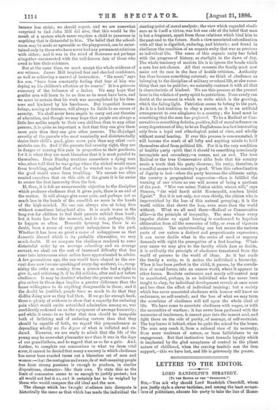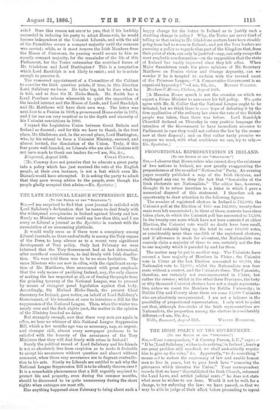LETTERS TO THE EDITOR.
LORD RANDOLPH'S STRATEGY.
[To THR RDITOR OP THE " SPECTATOR."1
SIR,—You ask why should Lord Randolph Churchill, whom you justly style a clever tactician, and among the least scrupu- lous of politicians, educate his party to take the line of Home-
rule ? Does this reason not occur to you, that if his lordship succeeded in inducing his party to adopt Home-rule, he would become independent of the Unionist Liberals, and with the aid of the Parnellites secure a compact majority until the measure was carried ; while, as it must remove the Irish Members from the House of Commons, its passing would secure to him an equally compact majority, for the remainder of the life of this Parliament, for the Tories outnumber the combined forces of Mr. Gladstone and Lord Hartington ? This is a temptation which Lord Randolph is not likely to resist ; and he is astute enough to perceive it.
The rumoured appointment of a Committee of the Cabinet to consider the Irish question points, if true, in this direction Lord Salisbury we know. He talks big, but he does what he is told, and so does Sir M. Hicks-Beach. Mr. Smith has a Land Purchase scheme wherewith to quiet the opposition of the landed interest and the House of Lords, and Lord Randolph and Mr. Matthews will have their own way. The latter was next door to a Fenian in 1868, a pronounced Home-ruler in 1874, and I for one am very sceptical as to the depth and sincerity of his Unionist convictions in 1886.
I regard the Legislative Union between Great Britain and Ireland as doomed ; and for this we have to thank, in the first place, Mr. Gladstone, and, in the second place, Lord Hartington, who, by his refusal to form a Unionist Ministry, ensured, and almost invited, the dissolution of the Union. Truly, if this fear prove well founded, we Liberals who are also Unionists will not have much to thank our leaders for.—I am, Sir, &c., [Mr. Conway does not perceive that to educate a great party into a policy which has just received the veto of the English people, at their own instance, is not a feat which even Mr. Disraeli would have attempted. It is asking the party to admit that they gave wrong advice to the people, even though the people gladly accepted that advice.—ED. Spectator]



































 Previous page
Previous page